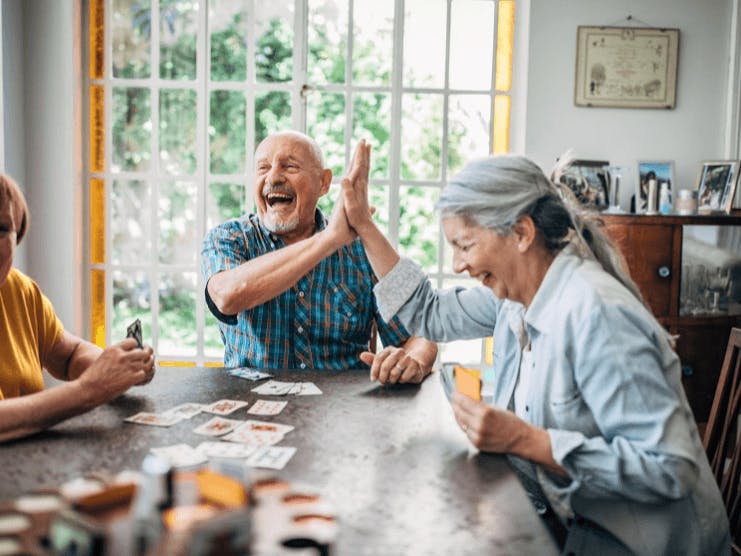
We asked residents to explain how they chose the right community, made friends, and built an exciting new life in retirement.
What comes to mind when you think of a retirement community? If it’s a bingo hall, then you’re in for a surprise.
Many retirement communities today are built around busy social calendars and healthy amenities. Along with clubhouses, these neighborhoods have pools, picnic areas, and modern fitness centers. They usually have medical services nearby, and if you’re so inclined, you can fill your days with hikes, yoga, and art classes.
In fact, the focus on healthy living has inspired these developments to move away from the name “retirement community” altogether. Instead, many of them are called “active adult communities.”
You might wonder whether one of these neighborhoods is right for you. But moving can involve giving up a comfortable routine or selling a house you’ve lived in for years. It’s a big decision.
To help you think it through, we spoke to four people who took the leap. Looking back, they were all happy they did. But they learned some lessons along the way. Here’s their advice.
Find your reason
Before you start shopping seriously for a retirement community, ask yourself why you want to move. This will not only help you narrow down your options, but it will also keep you motivated during a tough transition.
For Jim Owen, 81, and his wife, Stanya, the reason was health. They wanted to stay active, and they didn’t want their age to become a burden to their two children.
“There comes a time when you have to look at your life and make the decision of, ‘What happens if?’” says Jim. “What if one of us has a health problem? That’s just part of getting older. And we wanted to move to a place where we’d feel supported at every level.” Three years ago, they moved to a community in La Jolla, California.
Jodie and Rob Filogomo, ages 56 and 61, respectively, were also motivated by health. They were living in Denver, and Rob’s breathing issues were getting worse. But during stretches in the south, they noticed that the desert climate seemed to help.
“During multiple trips to Arizona to visit friends, we noticed that Rob breathed better down here,” says Jodie. “So we just took the leap. It was obvious Rob would feel so much better.”
Start looking early
Jim Owen is an author and filmmaker who produced the documentary The Art of Aging Well. He says he and Stanya still felt “a little young” when they began looking for a community. But that allowed them to be picky about what they wanted.
“If you wait too long, there may be no place for you,” he says. “Some communities have waiting lists that are years ahead. If we’d waited for another couple years, I don’t know that we would have found exactly what we wanted.”
You may be able to find what you want on a shorter timeline. But looking early will give you the most options.
Rent before you buy
Lee Gale Gruen, 79, lives in a retirement community in Northern California. But before she moved, she lived 400 miles away in Los Angeles.
“I had a very big circle of friends in L.A. and a house where I’d lived for 45 years,” she says. “But neither of my children were near me, and my sister had moved away.”
Gruen wanted to be near family up north, but she didn’t know the area as well. So she decided to try before buying. Many communities allow you to rent for a few months — or even permanently. So Gruen found a community she liked and started out as a renter.
She kept her home in Los Angeles, and for three months, she regularly drove around the community to explore the neighborhoods. Once she became familiar with the area and confident in her decision, she pinpointed where she wanted to live and focused her real estate agent’s attention there.
Today, Gruen owns her home, and she loves it. “But without that rental period, I probably would have been in an area that was less suitable for me,” she says.
Plan for an adjustment period
Any big transition can be bumpy. You may initially feel lonely or insecure, and there may be aspects of your community you don’t like. That’s normal, says Owen. It’s part of the adjustment period.
This can be hard for people who expect to find their groove on day one. But if you’re prepared for the initial challenge, it won’t hit you unexpectedly. And you can get through it faster if you focus on the reason you moved in the first place.
If you moved for health reasons, for instance, focus on building your healthy new routine. In Gruen’s case, family was her motivation. During the challenging adjustment period, she concentrated on her relationship with her son. Now he visits once a week, and they spend time together in a way they hadn’t for decades.
“When you’re the visiting grandma, you don’t tend to get that alone time with your child,” she says. “I have that now, and I’m also much more a part of the lives of my grandchildren and daughter-in-law. It’s absolutely wonderful.”
Put yourself out there and mingle
Clubs and activities are one of the biggest perks of living in a retirement community. It often feels like being on a cruise ship, says Rob Filogomo. “You could fill every hour of the day with activities if you wanted,” he says. “It’s impossible to get bored. Plus, it’s a great way to meet people.”
Even if you’re not an extrovert, joining activities can help you adjust quickly — and it can keep your brain young.
Sure, you might feel like the new kid in school. But grown-ups are generally nicer than children. “It’s intimidating and you may just want to stay home,” says Gruen. “But it’s important to get over that hurdle, and a club gives you an activity you love along with the chance to meet people.”
And once you’ve settled in, you might find your own way to make a mark on the community. Take Jim and Stanya Owen. They are very into physical activity, and over the past three years, they’ve become “fitness ambassadors.” They’re always there to help when someone needs to learn how to use an intimidating piece of workout equipment.
Be open to unexpected benefits
A big life change allows for new routines to form — and not all of them revolve around the community’s social calendar.
For the Owens, the community allowed them to better appreciate their lives together. Even though they’ve been married for 52 years, they now feel close to each other in a whole new way.
“We go for walks together every night, and we enjoy activities together here,” says Jim. “And I'm not sure we’d have that if we hadn’t moved. We’ve come to appreciate the fact that moving here helped us have a fuller life.”
Related reading: 3 Couples Share the Secrets to 40-Plus Years of Marriage


